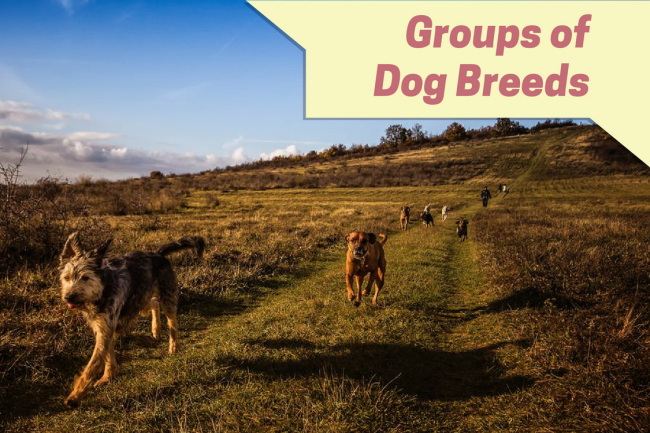Dog Breeds and Groups
People who are looking into adding a new dog to their family should understand the various canine groups and the breeds that are a part of them. Learning about the various dog breeds will help potential pet owners select the dog that is right for their home and for their family.
Gundogs, Hunting and Sporting
Sporting dogs, hunting dogs and gundogs were originally bred to help their owners on hunts. However, they also compete in sporting events.
Common breeds in this group include:
- Brittany Spaniel
- Cocker Spaniel
- English Setter
- German Shorthaired Pointer
- American Fox Hound
- Irish Setter
- Labrador Retriever
- Golden Retriever
Each of the breeds included in the gundogs, hunting and sporting group have different strengths when hunting. For example, hounds were originally bred for hunting and are divided into two groups.
Scent hounds were bred in order to develop their sense of smell and to assist on hunts. They were often used by aristocratic families as a sporting dog on their country estates. They generally hunted in packs over long distances. The Beagle is known as a scent hound because of its strong sense of smell and willingness to follow the scent for long distances. On the other hand, sight hounds were bred to have impressive bursts of speed and to hunt over short distances.
Popular hound breeds include:
- Beagles
- Greyhounds
- Dachshunds
- Rhodesian Ridgebacks
- Bloodhounds
This group of dog can often be aloof. The dogs in this group are loving dogs who dote on their owners. Hounds still have a strong hunting instinct, but they can make wonderful family pets with proper socialization. Future hound owners should be aware that their new furry family member will definitely need the space and time to run and exercise.
Pastoral and Herding
Pastoral dogs were bred to work a pasture and to help farmers complete their daily tasks. This group of dog is generally coupled with herding cattle, sheep and other cloven footed animals.
Examples of dogs in the herding group include:
- Australian Cattle Dog
- Border Collie
- Welsh Corgi
- Australian Shepherd
- Lancashire Heeler
In a family setting, pastoral dogs are friendly and love their owners. They are very intelligent and can easily be trained by their caretakers. They are an ideal breed for an outdoorsy family. Although they are generally very friendly and energetic, they still have some of their initial herding instinct and can express that by “herding” the family. However, with proper socialization they are a welcome addition to an active family.
Terriers
Terriers are a group of smaller dog breeds, many of which are active and spirited. They were originally bred to hunt underground. These dogs are generally compact. The terrier group is recorded as the fourth most popular group of dogs.
Some of the more popular terrier breeds include:
- Bull Terrier
- West Highland White Terrier
- Staffordshire Bull Terrier
- Scottish Terrier
- Airedale Terrier
Terriers make great household pets, but their personalities should be matched by their owners. Terriers can have a feisty demeanor, so it’s important to consider this when choosing a pet. They generally need a moderate amount of exercise and enjoy long hikes or a game of fetch. Like any other breed, they benefit greatly from proper socialization.
Toy
Unlike other canine groups, toy dogs were bred for the purpose of companionship. Toy dogs make wonderful family pets, especially for those who live in small spaces such as an apartment. They are sweet and loveable, and easy to control because of their size.
Some examples of dog breeds in the toy group include:
- Yorkshire Terrier
- Italian Greyhound
- Cavalier King Charles Spaniel
- Pug
- Maltese
- Bichon Frise
- Pomeranian
- Chihuahua
Many of these breeds love to be lap dogs and true companions to their owners. Although these dogs are much easier to control because of their size, they are also more vulnerable to injury. It is important for the dog’s potential family members to be careful when playing to avoid injury.
Working Group
The dogs that are a part of the working group were originally bred to do just that — work. Working dogs held a variety of different jobs, such as pulling sleds, guarding owners and property and helping law enforcement officers with land and water rescues. While working dogs make good companions and their intelligence makes them easy to train, they tend to be unsuitable for some families. They are very strong and large, which can make them intimidating to children.
Dogs in the working group include:
- Bernese Mountain Dog
- Doberman Pinscher
- Siberian Husky
- Great Dane
Non-Sporting Group
The non-sporting group is a varied collection of dogs that were not always bred for a specific purpose. While some make good companions, others have a more challenging personality. Dogs in the non-sporting group vary in size, coat, and temperament. Each breed should be investigated on an individual basis when choosing a pet.
Dogs in the non-sporting group include:
- Dalmatian
- Poodles
- Shih Tzu
- Chow Chow
- French Bulldog
Nutrition
No matter what dog breed you decide to include in your family, it is important to supply proper nutrition for your new canine companion. It is important to add NuVet Plus to your pet’s daily diet for immune system support. Why supplement your pet’s diet with NuVet?
NuVet Plus is designed for all stages of your pet’s life. This natural supplement is filled with antioxidants, amino acids, vitamins, minerals, and herbs that complement your pet’s diet. Furthermore, it is cold processed to maintain the rich nutrients of the ingredients.
Learn more about NuVet Labs and their superior nutritional supplements by following their tweets on Twitter!


